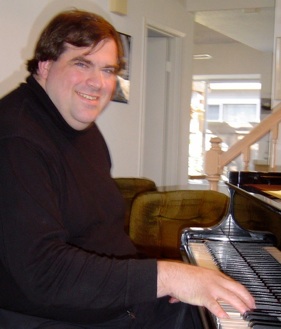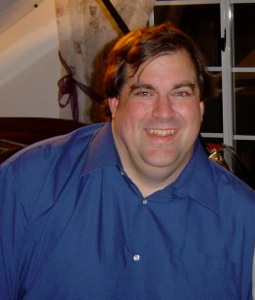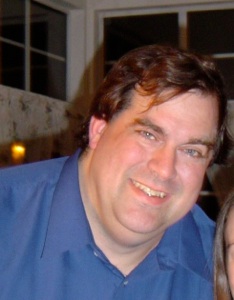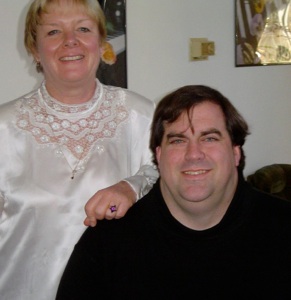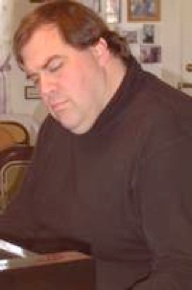I first became aware of Richard Carr and his music while writing for “Wind and Wire” magazine in 1999. “Fogland” was sent to me for review, and I was fascinated by the fact that one of the songs, “Sonoma Coast Sunset,” was inspired by one of my favorite beaches, Goat Rock near Jenner. Carr’s recordings are improvised in the studio, and are generally without edits. Over the past several years, I have reviewed all of Richard’s albums except his first one, and I thought it would be fun to meet while I was in New Orleans last May. As it turned out, Richard lives right around the corner from our hotel in The French Quarter, and we had a delightful evening at a neighborhood cafe. He told me then that he planned to be in California early this year and would like to do a concert or a workshop with my students, so we’ve been working on this event for awhile. We did this interview by email, but first some biographical information:
Richard Carr was born and raised in St. Louis, Missouri, in the early 1960’s. He started piano lessons at the age of six, and continued lessons for nine years; he also took lessons for two years in college. Richard started improvising at age 11 or 12, and wrote his first song at 12. In high school, he played French horn for four years without any lessons. In college, he played French horn, euphonium, trumpet, and mallet percussion for the university bands. Richard says he hasn’t touched any of those instruments in years, but plays pipe organ and synthesizers in addition to the piano.
Richard attended Benedictine College in Kansas from 1980-82 as a Business/Accounting major. He then went to Southern Illinois University for three years, and earned a BM in Music Theory/Composition. From 1985-90, he attended The University of North Texas, doing graduate work in Music Composition. He then took a totally different direction and went to The University of the Pacific in Stockton, CA, from 1990-93, earning his Masters Degree in Sports Management. He was part of the coaching staff of the men’s volleyball team and was the assistant director of campus recreation, among many other things, in the Athletic Department.
Richard moved to New Orleans, Louisiana, in the fall of 1995 to take a job at a university, running their campus recreation program and developing the men’s volleyball program in the state of Louisiana. That job lasted about five months, and Richard has been a full-time musician ever since. In addition to composing and performing his own music, Richard hosts a weekly series called “The Original Music Series” that has been running for 18 months and features some of the best singer/songwriters in New Orleans. Every April, they have a two-night showcase with more than 60 performers that benefits the New Orleans Musicians’ Clinic.
KP: Were you encouraged to improvise or compose by your piano teachers?
Carr: No, not early on. Although it wasn’t encouraged, it wasn’t completely frowned on, either. I liked to browse through my music books, which was the beginning of my sight-reading skills. Browsing increased my appetite for wanting to learn more music, but it didn’t help me practice what I was supposed to be working on! It did, however, keep me at the piano much longer than my one hour of daily practice.
KP: Did you play with any rock bands in high school and/or college?
Carr: In high school, I was in a basement band for a couple of years. We only played out once in a great while. In college, I was in a Dixieland ensemble and a Jazz Combo for a few semesters. That was more or less for class credit. Also in college, I spent two years as Elwood Blooz in The Blooz Brothers Band. It was a lot of fun!
KP: At what point in your life did you know or decide that you were going to be a professional musician?
Carr: This time? January 9, 1996. I had just left a job, and was given an opportunity to play at The Blacksmith Shop in the French Quarter of New Orleans. I haven’t stopped playing professionally since then.
KP: Did your parents or family object?
Carr: Once my family got over the shock that I had left the other job, they were quite happy I was back into music. Most of my family figured I belonged in music long before I realized it was the right place for me, so it was no surprise to them that I came back to music after a while in another career.
KP: Who or what are your biggest musical influences?
Carr: Creative influences in my music can be found in the music of Keith Jarrett, George Winston, John Adams, Steve Reich, Tangerine Dream, the Russian composers, and the French Impressionist composers, among others.
KP: What inspired you to start composing your own music?
Carr: Exploring different sounds on the pipe organ got me started. My improvising on the piano continued that process. One day I said, “Hey, that sounds good! Maybe I should write it down.”
KP: Is there a particular philosophy that you try to convey in your music?
Carr: This is something I have been exploring lately. My music has an underlying healing spirit that is recognized by many. I call my music “soundtracks for the soul, mind, and body,” so I guess I have developed a philosophy for my music without actually thinking about it.
KP: With New Orleans being such a traditional jazz center, how is it for an artist who is composing new music that doesn’t fit that genre?
Carr: I am flying under the radar most of the time when it comes to the music scene here in New Orleans. Most people want to hear the jazz that made the town famous. It is only when I slide one of my own compositions in with the rest of the music that people take notice. Because of my work with the singer/songwriters, many people know who I am. The musicians appreciate my music, and sometimes the appreciation of my peers is all I have to work with here in this city.
KP: Most performing musicians have to work at playing other people’s music in bars and restaurants while they get their own careers launched. How about you?
Carr: I played in restaurants in the French Quarter for 6 1/2 years. Much of the time, I was playing somewhere every night of the week. By the time I stopped playing regularly scheduled gigs, I was playing about 40% of my own music. Playing covers allowed me to rebuild my chops to where they are today (which is better than they ever were before). It also reaffirmed my sight-reading skills, which are genuinely helpful in many circumstances. Playing covers is refreshing at times - especially when the request isn’t a common one. I had two guys from Finland swear I play Elton John’s music better than he does!
KP: I’ve read that you have several things you do on a regular basis before and during a recording session. What kinds of things do you do?
Carr: The recording aspect is what I consider the most rewarding part of the whole process. It can also be the most frustrating when it is not going well or you are not prepared.
I spend most of my day thinking about the recording session (which is usually at night). Generally, I will spend the first 30 minutes of a session reworking a previous improvisation, and then the rest of time is all fresh improvisation. I rarely record more than two hours at a time because after two hours, things start to sound the same to me.
I like to get into the recording situation as often as possible - at least once a month, ideally. My belief is that the more often one is in the recording situation, the more comfortable and more productive one can be in the studio. Recording is second nature to me now, and I can focus on the creation process rather than worrying about it.
During a recording session, my engineer and I drink Arizona Iced tea. We dim the lights real low for ambiance. Then we let the soul and heart and hands do the rest. Eating is also involved, either before or after the session.
KP: You are known as a solo piano artist, but I understand you are moving in other directions. What are your newest projects?
Carr: Recently, I spent a few days exploring the capabilities of my Kurzweil keyboard. The results were about eight hours of improvisations. We took some of the best of these and put them into a project called “At Heaven’s Edge.” Most of the project would be considered ambient space music. This has opened the doors to music with a wider palette of sound. The CD will be ready for release very soon.
Another project is a two-piano release entitled “Four Healing Hands.” Pianist, Alx (not a typo) Uttermann was directed to meet me about four years ago by her teacher/mentor, John Milak, who happened to be my high school band director and a mentor of sorts. We met in New Orleans during JazzFest and realized that there is something special between us. We spent a few hours on the 9’ Steinways at Tulane University, and recorded some really magical music. All freely improvised, this music has a very mystical, healing quality to it. Alx has been in India ever since we recorded in 2000, but is planning to return to California soon. We are trying to time the release of “Four Healing Hands” with her return to the US, probably July 2004.
I will be finishing the recording of a meditation CD with Native American flute player, Bradford Smith. I found Brad at a New Age Exposition in St. Louis, and asked him if he was interested in doing a collaborative effort. We spent a few hours in his home studio and recorded three improvised meditations. After the experiment, we agreed to do another eight tracks or so for a CD release. Look for this sometime in the late spring/early summer of 2004.
In late April, I have two, maybe three, phenomenal guitarists coming to New Orleans to record. The two confirmed guitarists are Josef Glaude from Tulsa and Dave Isaacs from New York City. Both are classically trained and have really wonderful touch and sound. Josef also plays and designs harp guitars, which creates some additional opportunities for the sound palette. I am really looking forward to these sessions - maybe we will do a “two guitars and a piano session.”
KP: How is your plan to tour and play concerts in churches all over the country working out?
Carr: Things are coming together slowly. As every touring musician knows, it takes a lot of time and effort to put tours together. Sometimes I have to call 30-40 churches in one part of the country before I get 5-10 places to perform in. It takes time and patience to get it done and make it work smoothly. I spent all of December in the Midwest, traveling 5000 miles in 25 days, with 19 appearances in five states. The West Coast tour is going to be ten weeks long. I am planning a tour of the Upper Midwest in June and July, and the East Coast is on the schedule for August through October. Then the Christmas tour will be creeping up!
KP: Your recorded music is highly improvised. Do you ever start with pre-composed themes? How much editing do you do to your music once it’s recorded?
Carr: For as long as I have been composing, I have always started by doodling ideas on the piano. In college, before writing anything down, I would play the ideas out completely several times. Then I’d take a walk or head to the gym, and then come back to see if the idea was still there. If it was, then it was an idea worth working on. Occasionally, a tune will travel around in my head for a few days before I get it down on tape. Hopefully I will be getting more of those ideas down as my computer and keyboard become more compatible. Until “Momente Intimate,” [Richard’s newest release] there was never any editing done to the recorded music. It is my belief that we need to record the music as it comes - the music of the moment, so to speak. However, there has been some professional criticism that suggests that the piano recordings should be error free. When I was recording “Momente Intimate,” if I made a mistake, I would replay the phrase within the improvisation so we could edit out the errors. In this way, the integrity of the improvisation is not compromised. Even with that concept in place, there were only two such spots in the entire 75+ minutes of music.
KP: Since your recorded music is spontaneous and off-the-cuff, how do you prepare the music for live performance?
Carr: I literally put the CD into my player, plug the headphones in, and play along with it. My notes from the recording sessions will tell me the key structure, sometimes the basic pattern or idea, but not much more. Once I have performed the music a few times, the essential concepts of the compositions are retained in my mind. I believe that my music is alive - constantly growing and developing. Very few of my compositions are played the same way every time. With some of them, I never know where they will go. If listeners want to hear a certain composition just like it sounds on the CD, they might be disappointed, but they will hear the composition in its current form.
KP: How do approach a live performance?
Carr: I generally have the program developed a few days in advance. There are several pieces that are on each and every program, but I vary the program enough to make each concert unique. Of course, the improvisations created on the spot will be different at each concert. There is a general routine that I go through, time permitting, before each concert. A couple of hours before the concert, I go through the program, starting each piece, sometimes playing all of it (especially if I recently added it to the program). Then I set up the merchandise and take a brief walk. After that, I change into my concert attire. Generally, 15-20 minutes before a concert, I find a quiet spot to get focused; then it is concert time!
KP: You have mentioned that emerging artists need to be prepared to deal with a lot of rejection. How do you toughen yourself to rejection and keep your self-confidence up?
Carr: For every YES I get, I have heard many NO!’s. You have to have a conviction and belief in yourself. It certainly helps if you have other people who believe in you, too. You have to be honest with yourself and cannot place unrealistic challenges in front of you. The competition is extremely intense. Most artists have to prove themselves through a long series of showcases and appearances, selling CDs at gigs, etc. It is a lot of work, and the level of commitment has to be very high. One of the biggest things I have going for me is that I am very patient and am willing to do the work myself. I am quite realistic about where my music has a chance of being successful, and the amount of radio success I’ve had validates that what I have been doing is worthwhile.
I have been a full-time musician for several years. There have been some very lean times, but I have had a lot of support when things looked pretty bleak. There are a number of people who have given me the opportunity to continue my music without being worried about a day job that has absolutely nothing to do with music. Working another job, even if it is only 20-30 hours a week is too distracting for me. Playing covers in a hotel lounge can be considered an opportunity for practice or to try out new music, so that isn’t as bad. Working as a cook, waiting tables, or selling shoes or real estate would be a major distraction to being a musician - at least for me.
KP: Do you have a favorite of your CD’s?
Carr: I generally say that my favorite is the one I am working on. However, I suppose “An American Quixote” is still my favorite. It stretched my ability as a pianist and broadened my listeners’ ears to a different harmonic set. It challenges the listener - something I really like to do. That CD is also fairly autobiographical.
KP: What is your best-selling album to date?
Carr: “Fogland” - I’ll be doing the fourth pressing of it very soon. “When Soul and Heart Collide” is right behind it, and will be going into its third pressing.
KP: When we were arranging to meet in New Orleans last May, you said I’d have no trouble finding you because you’re a “big guy.” How tall are you?
Carr: I am 6’6”.
KP: Where did your label name, Rec’D Music come from? How do you pronounce it?
Carr: Rec’D Music is pronounced similarly to “wrecked music.” My initials are REC. Therefore, the music coming from my label has my stamp on it, so to speak. It is also convenient that it could be construed (or misconstrued!) as “Recorded Music” or “Received Music.”
KP: You mentioned that you have a huge record collection. How many (approximately) albums do you have, and what styles of music are included?
Carr: Right now I have approximately 11,000 album titles in my collection. There is an eclectic blend of 60’s, 70’s, and 80’s keyboard-oriented rock, an enormous amount of classical symphonic and piano music, and a good variety of jazz and blues. There is a heavy concentration on 20th century classical music of all varieties.
KP: You also mentioned that you often spend many hours a day on the internet. What kinds of things are you researching?
Carr: I am constantly looking for places to promote my music online, searching for venues to perform in, locating radio stations that might be interested in programming my music, reading and learning about various aspects of the music business. The whole music world is in a constant state of change, so I try to stay on top of the changes. Occasionally, I will permit myself some time at the JigZone (an online jigsaw puzzle website) or playing one of the four or five games I have on my computer.
KP: Who are your favorite composers?
Carr: Tchaikovsky, Rachmaninov, Shostakovitch, John Adams, Steve Reich, William Schuman, Ives, Gershwin, Scriabin, Debussy, Ravel, and Chopin.
KP: Who are your favorite performers?
Carr: As far as pianists go, Keith Jarrett, Elton John, Billy Joel, and Henry Butler (New Orleans’ best pianist, in my opinion). Other performers in the music world I really like are David Bowie, Peter Gabriel, Ian Anderson, and Leonard Slatkin (conductor).
KP: Do you have any hobbies?
Carr: Record collecting, stamp collecting, wine tasting, traveling. I play pool once a week in a league in The French Quarter. Lately, my recording engineer has gotten me interested in playing poker.
KP: If you could have any three wishes, what would they be?
Carr: 1) That all children have two caring parents in their home, all the time - it would probably solve many of society’s problems.
2) That all composer/performers such as myself would be willing to join together and form a cooperative effort rather than re-creating the wheel for themselves.
3) One wish for me personally - to have just enough success to be able to create and work in my chosen career without having to be constantly worried about the financial aspects of the career and just general living.
KP: Do you have any words of advice for young people who are studying music now?
Carr: Don’t forget to explore all aspects of life. If you are meant to be a professional musician, it will happen - but not without lots of effort on your part. The life experiences outside of music will only enhance your music and the interpretation of other’s music. Be able to accept rejection, but do not let it stop you - find out what caused the rejection and learn or correct the problems. Nothing ever happens without being prepared for it to happen - if you think it does, then you will be disappointed constantly. No matter how much you think you know, there is always more to learn.
The most important thoughts I might be able to give are for everyone, but especially those studying music: remember how to laugh at yourself; remember how to have fun; never forget to relax; take 5 minutes each day just for you and your thoughts, completely away from the rest of the world.
Kathy Parsons
April 2004

